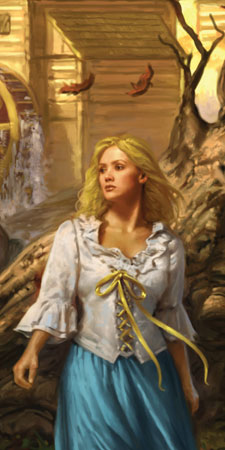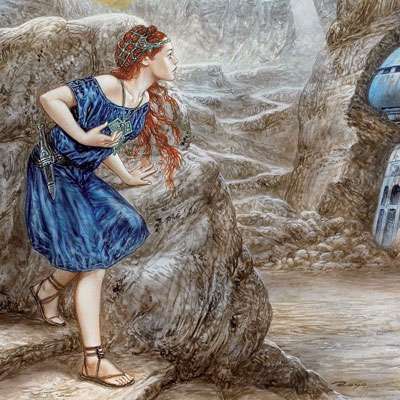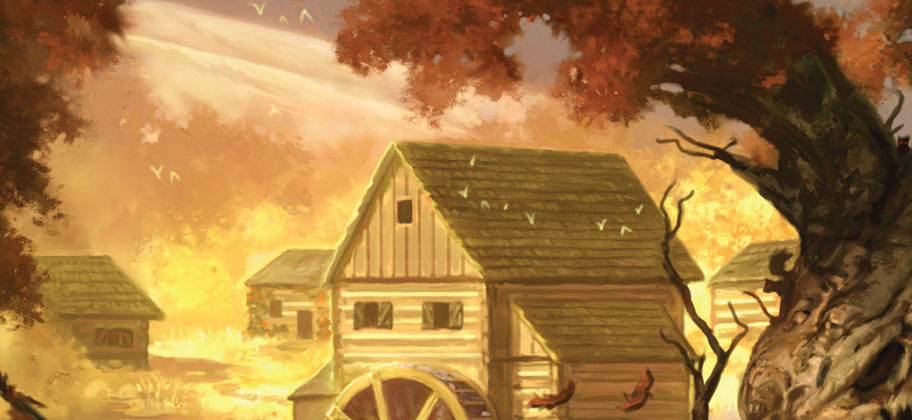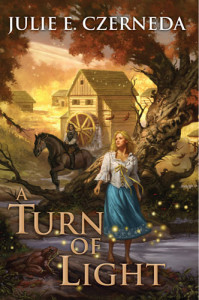How could I not embrace science fiction? Literature that took me outside the here and now, to look back from somewhere else.
I’ve written science fiction for a while. Okay, since I was ten, which was the year before the first episode of Star Trek aired. I’m a child of the Cold War, of monster movies (Rhodan!), and of the seemingly limitless vistas of technology and space. My textbooks changed while I was in school, adding the discovery of DNA as well as the perils of pollution. In my university room — in everyone’s — hung the first photo of this planet taken from somewhere else.
How could I not embrace science fiction? Here was literature that spoke of what was happening in the world around me — and what I hoped might happen. (Or not!) Literature that took me outside the here and now, to look back from somewhere else. When I discovered my first volume in the school library (Andre Norton’s The Star Rangers), it began more than a love affair. As a budding scientist, science fictional thinking, replete with questions and speculations and curiosities and wonders, was like coming up for air. When I became a biologist, it became my most trusted skill set. I could frame questions. I would search out answers. Findings, the fun ones, should challenge preconception. Science fiction, to me, has been how I talk and dream science. It’s made me a better communicator. It’s given me a venue to share my passion.
 Fantasy?
Fantasy?
I’ve read fantasy just as long. I love it just as well. I didn’t imagine myself writing it. (More on that later.) I read fantasy for many reasons. For one thing, I like dragons. But the prime reason? To look outward and away.
In the fantasy I love best, I’m drawn into a world created not to explore a question or mirror reality, but to come to life solely within my imagination. A place of different rules, where who you are and what you do matter most. Where dragons roar and fly because that’s what dragons do, not because the author’s carefully explained how that’s possible. (Which to me would be science fiction.) As science fiction feels like coming up for air, fantasy is like floating in a dream.
It wasn’t my decision to try writing fantasy. I was in the DAW suite when Martin Greenburg and Larry Segriff invited me to submit a story to their anthology. My second invitation! I didn’t realize till too late it was to a fantasy anthology called Battle Magic. Oh well. Toe in the water, so to speak. My fervent injunction to my test reader was “does it read like science fiction?” Based on his informed response (I picked an editor of my non-fiction who was a fantasy reader), I’d delete the entire thing or submit it. He made me wait an entire afternoon …
Then said I’d written an unmistakable fantasy. To be fair, the godlike turtle could have influenced him. Still, I’d done something I’d not attempted in my science fiction. Yet. I wrote like this:
A finger of darkness scratched the crystalline sky above me, a moving finger casting its shadow and more into my sight. Six forms detached from it, drifting down to me in synchrony and sacrifice. In their wake, I could hear the old words.
The Summoning.
The forms, small and devoid of armour, fell closer. The flocks converged, undeterred by blessing or purpose. Blood stained my vision and didn’t diffuse into the ocean as it should. Instead, it flowed down to me, coated me, entered my mouth tasting of innocence shed for rage’s sake.
At last!
If I had slept, this was the moment I awoke.
‘Ware the Sleeper
My science fiction self happily plunged into the world-building. When I wrote of ships and oceans, I learned what I needed to make them seem real. My fantasy self? There was, as I mentioned, the turtle. There was also an unexpectedly intense amount of emotion, both expressed by the characters and within me as I wrote. Not that I don’t get emotionally invested in all my stories — if I didn’t, they wouldn’t be worth writing or reading — but in this first short fantasy, those emotions were the point, rather than the reaction to a consequence. Fear. Self-sacrifice. Loyalty. Madness. Courage. Peace.
My goodness.

The story was published, to my great relief, and I continued to write more science fiction, including my next novel, Beholder’s Eye. First of the Webshifters series, Beholder’s Eye was also when I began to cut loose. Looking back, I can’t decide if writing the fantasy story at the same time was somehow a cue or whether the novel — and ever-so-fun to write main character, Esen — helped me find the emotional depth of the fantasy short. Likely both are true. (I was also writing physics at the time. Day job. I suspect it came into the mix as well. Check out the flying sequence.) Regardless, I threw humour and pathos and all manner of things that pleased me, as a reader, into the novel, confident my editor would summarily haul me back from the emotional precipice I’d toppled over in my joyful cutting loose.
Not so much.
I stepped out on my porch, seeing the future and completely content with what I saw. We would guard this gateway together.
Beholder’s Eye was my first Nebula recommended work, making the preliminary ballot. It remains a reader-favourite, and mine too. The science, and science questions I posed, were blatant and throughout this book and those that followed. I’ve readers called “biogeeks” who rejoice to find the real biology. At the same time, it’s a passionate story, about loss and friendship and duty.
I stepped out on my porch, seeing the future and completely content with what I saw. We would guard this gateway together. He would show me how to enjoy life as only an ephemeral could. In return, I would share with him whatever he wished to learn of other species, possibly even satisfying his inordinate curiosity — though I somehow doubted that.
We would be together as long as he lived.
And after that, I would remember Paul Ragem, my first friend, until the hearts of stars grew cold.
Beholder’s Eye
My next official foray into fantasy followed another anthology invitation. (By this time, I knew Marty Greenberg & Co. well enough to tease them about that.) I wrote my first contemporary story for Spell Fantastic, “The Midas Spell,” about a football player at the end of his career. In it, there’s a hint of the living magic I adore reading.
Blood-red geraniums guarded spikes of foxglove; dark-eyed daisies watched the thyme as it swallowed his footsteps in fragrance. Even the air of the walkway to the front door felt — wary. Normally, Leonard P. was a man devoid of fantasy, contending with enough real demons on the playing field. Here, having finally climbed out of his car to approach the cottage, he found himself ready to believe almost anything.
The Midas Spell
 It’s not much, but I remember being enchanted by the image of a garden aware enough to have opinions. Might explain the great care I take of ours … and perhaps the toads in A Turn of Light.
It’s not much, but I remember being enchanted by the image of a garden aware enough to have opinions. Might explain the great care I take of ours … and perhaps the toads in A Turn of Light.
Five years passed before I wrote another fantasy story. (A horror for Russell Davis notwithstanding.) I didn’t stop cutting loose, mind you, but I wasn’t quite comfortable with it. While I knew that if the words made me laugh out loud or sob, they were the right words, I still had moments of hesitation. (That emotional precipice loomed. Ask my editor-dear.) During this time, I wrote Species Imperative, in my view the most rigorous sf I’ve done yet — certainly the most deeply researched — and most of my revisions involved going straight to those places I’d flinched from at first draft and filling them out properly.
I also started, during those five years, making very secret notes about something completely different. My first fantasy novel. In 2005, I sold it — as little more than a concept, really — to DAW, then wrote other stuff for another four years. Being inclined to research, and knowing I’d a great deal to learn about fantasy writing, I sought more chances to write fantasy shorts.
And wound up writing my first novella.
Scribemaster Saeleonarial knew his own worth. His rise through the ranks of his peers had more to do with honesty, a good head for names, and modest ambition than brilliance. Oh, he’d written one intention of memorable originality. The result still swam in the temple fountain of Xcel, all grave eyes and mischievous whiskers, trilling its song by moonlight to bewitch even dry old men with lust. Gossamer.
Not an accomplishment to share. He’d hastily destroyed that pen and done his utmost to forget those words and its shape. Though he dreamed it. When the world grew drab by day, predictability more deadly than age, he’d wake in the dark, blood pounding. At such a moment, Saeleonarial would swear he’d heard a faint splash, smelled musk on a warm summer’s night. Been young and unafraid of the future again.
The Deathless Lady wasn’t above irony.
Gossamer Mage: Intended Words
I love worldbuilding, but it was while writing this novella I finally appreciated the scope demanded by a long fantasy. Clothing. Maps. Histories. Dialects. Religions. Economics. On top of the usual technology, biology, physics, and sociology and so forth. For me, the crux of a science fiction story, where so much is speculation and imagination, is keeping the science real. Ground the concept that matters, then let the ideas soar. For fantasy, the kind I was writing and wanted to write, where the ordinary becomes something quite different? The grounding can only be done through the world itself.
And must be thorough. A rich tapestry, as opposed to a pencil sketch. In science fiction, like a sketch, I could describe the outline for an alien face or an item of future tech and trust my readers’ imaginations to fill in any gaps while they followed the story. In fantasy, small familiar details are like threads weaving the reader’s belief in the world. I mentioned earlier that the fantasy I love reading is able to transport me into another, magical place. Any mistakes in the familiar — any “huh?” moments that break the flow — and for me the entire story falters.
The transition between the two genres? In hindsight, it was difficult only in my need to gain self-confidence with the one I didn’t come at with knowledge. I’m cocky about my science fiction. To me, it’s a stretch of my biologist’s muscle; a return to roots, so to speak. Fantasy? That’s me spouting words that sound good together, trying to woo readers with the impossible. Maybe I’ll never be fully confident about that.
Maybe that’s as it should be. A little nervous adrenalin can be a good thing.As for learning, one to the other? My worldbuilding in fantasy doubtless owes its somewhat obsessive thoroughness to the love of research my science fiction has allowed me to indulge. Plus I know to focus on what matters most. What characters touch. What they see. What they use. What they care about. What has my science fiction learned from my three years away writing fantasy? Well, I’m a better writer. I pay more attention to word choice and cadence. Oh, and I assure you a normal length story doesn’t seem such a big deal anymore.
Most importantly, I’ve a feeling writing fantasy will help me cut loose more than ever. I’ve hesitated at that emotional precipice too often, potentially to a story’s detriment. Having poured out my heart in A Turn of Light, I can’t see hesitating again. If that’s the ultimate consequence of challenging myself to write in another genre?
Not bad. Not bad at all.
Referenced works:
“’Ware the Sleeper” 1998 Battle Magic ed by Martin H. Greenberg and Larry Segriff DAW Books
“The Midas Spell” 2000 Spell Fantastic ed by Martin H. Greenberg and Larry Segriff DAW Books
“Gossamer Mage: Intended Words” 2008 Jim Baen’s Universe Magazine ed by Eric Flint (sold to DAW Books to be expanded as a novel)
Beholder’s Eye 1998 DAW Books
Species Imperative #1-3 Survival, Migration, Regeneration 2004-5-6 DAW Books



